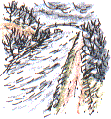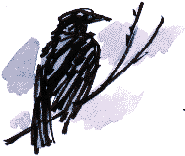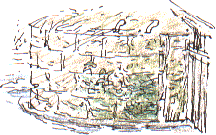 Free as a FishWednesday 15th March 2000 I DON'T HAVE to walk far along the towpath before I forget the problems I've been sorting out all day. I'm soon feeling less tense. A cool wind ripples the canal which, reflecting a dull sky, looks like hammered pewter.
I get as far as the Figure of Three lock and spend five minutes leaning on the fence, just looking at the centuries-old stonework (it may date from as far back as 1760). It is so worn in places that it is almost a natural rockface. Near the waterline it is encrusted by moss and liverwort. Rosettes of tropical-looking Hartstongue Fern grow from some of the crevices. It's good to get away
Ruskin might well have been attracted to this scene of waterway and worn stone. The faded Gothic grandeur of Venice made a big impression on him. He described the city as if it was halfway to becoming an organic form or geological formation.
'Remember that the most beautiful things in the world are the most useless, peacocks and lilies for instance.''I doubt that art needed Ruskin,' wrote Tom Stoppard, 'any more than a moving train needs one of its passengers to shove it.' But I have a soft spot for the Victorian prophet. We lived on a Ruskin Avenue for the first five years of my life, I've exhibited at Ruskin's house at Brantwood and at the Ruskin School in Oxford. Here's just one more Ruskin quote, to suit my waterside escape from the stresses of day to day life;
'No human being, however great, or powerful was ever so free as a fish.'
|

 Last year's leaves are purplish bronze on the Brambles. Wood Pigeons and Crows have taken on a designer look. In soft greys and classic black they complement the sombre colour scheme of the afternoon.
Last year's leaves are purplish bronze on the Brambles. Wood Pigeons and Crows have taken on a designer look. In soft greys and classic black they complement the sombre colour scheme of the afternoon. from the 'civilization' of my studio for a few moments and just look at something with a quality of wilderness about it. Or in this case, a subject that's at a halfway stage between the organic and the man-made.
from the 'civilization' of my studio for a few moments and just look at something with a quality of wilderness about it. Or in this case, a subject that's at a halfway stage between the organic and the man-made. It seems strange that something as simple as a brisk walk on the towpath to look at something as mundane as a canal lock could put me in a calmer frame of mind, but I'm in distinguished company. There's centenary exhibition about the Victorian writer and art critic John Ruskin (1819-1900) in London at the moment. He believed in drawing every day and he regularly made accurate studies of such subjects as rock formations and clouds. He felt there was a Moral Law at work in Nature. I wouldn't want to see morals in nature, I want it to be just whatever it may be, but I like to feel I'm seeing a bigger picture than my niggling everyday concerns.
It seems strange that something as simple as a brisk walk on the towpath to look at something as mundane as a canal lock could put me in a calmer frame of mind, but I'm in distinguished company. There's centenary exhibition about the Victorian writer and art critic John Ruskin (1819-1900) in London at the moment. He believed in drawing every day and he regularly made accurate studies of such subjects as rock formations and clouds. He felt there was a Moral Law at work in Nature. I wouldn't want to see morals in nature, I want it to be just whatever it may be, but I like to feel I'm seeing a bigger picture than my niggling everyday concerns.